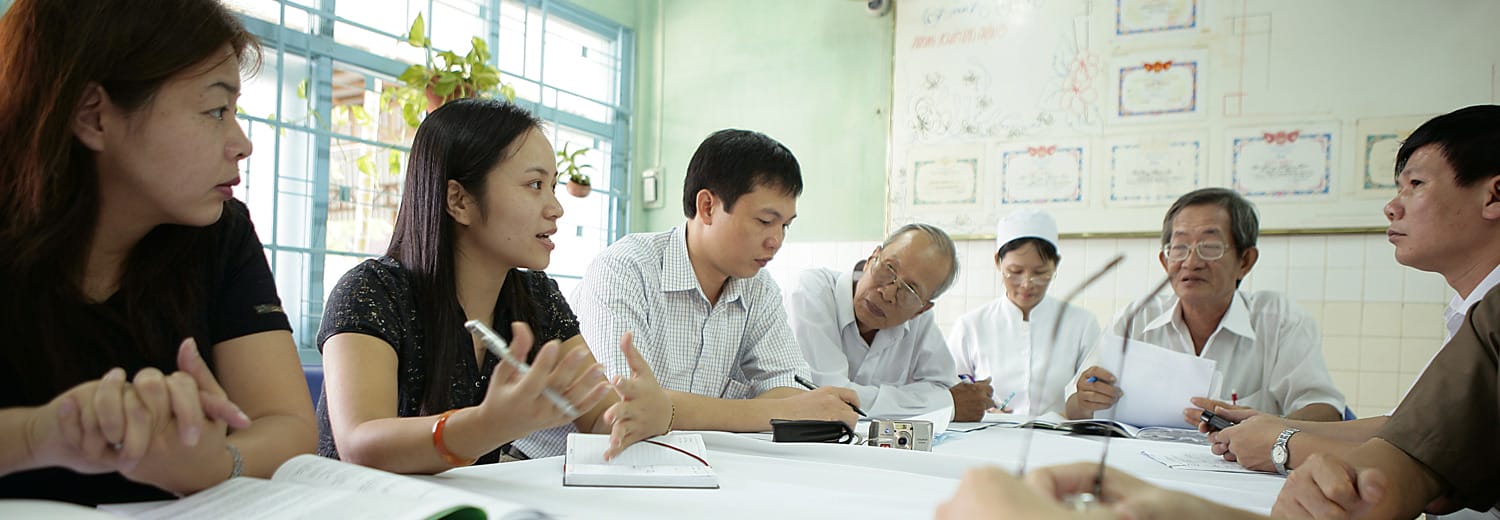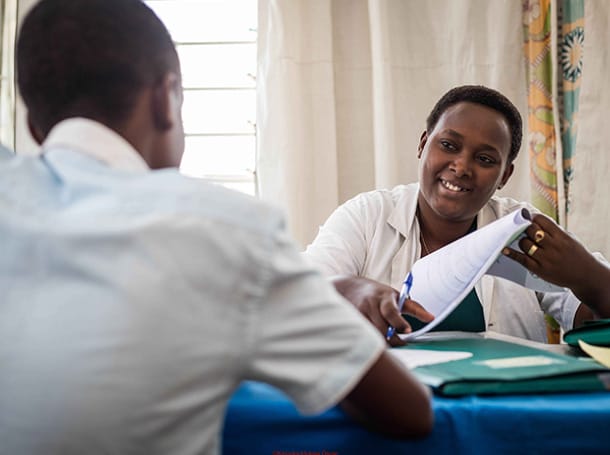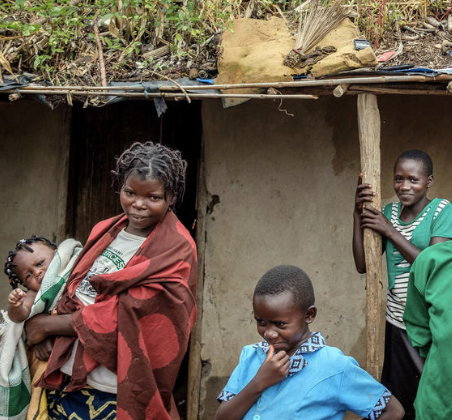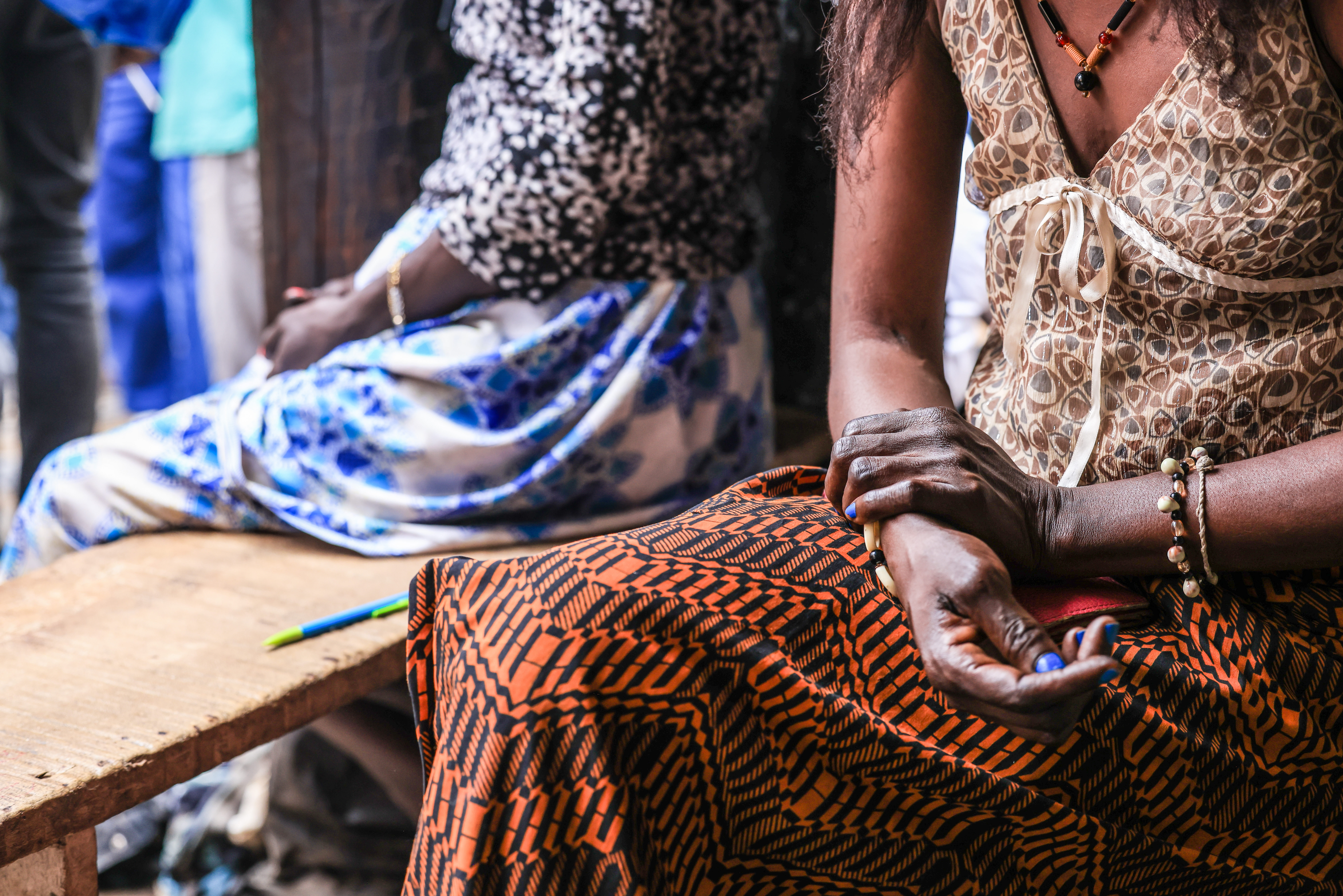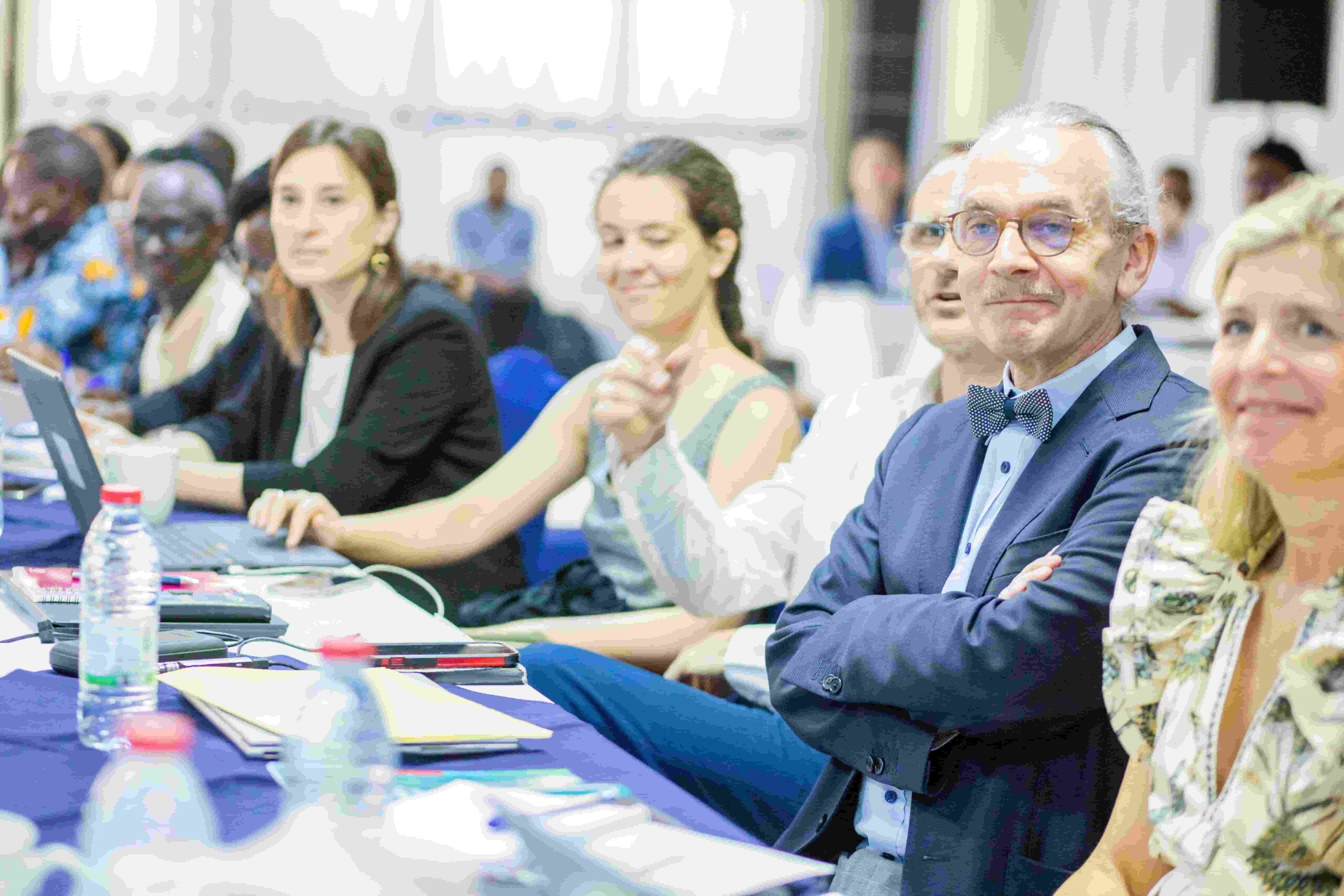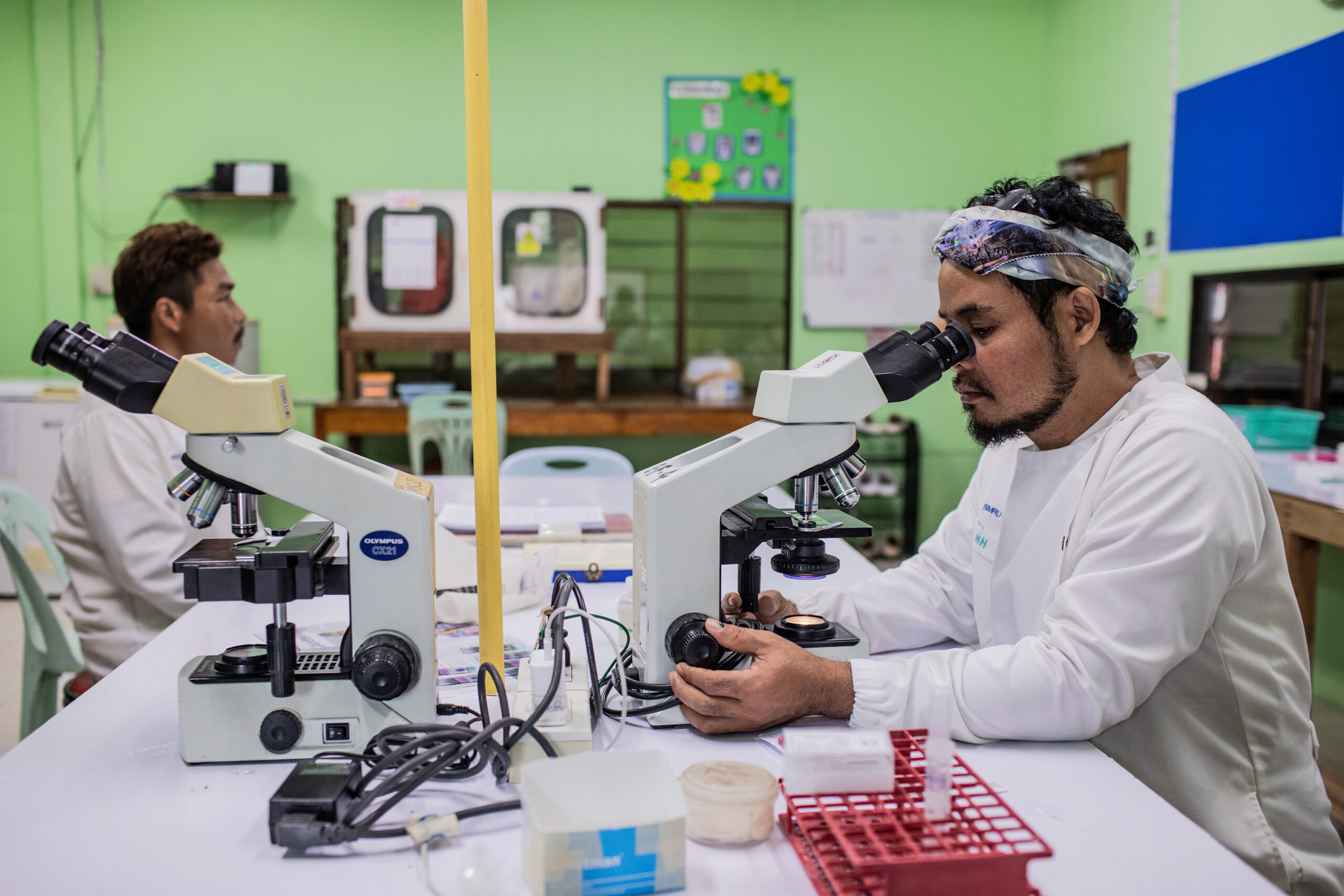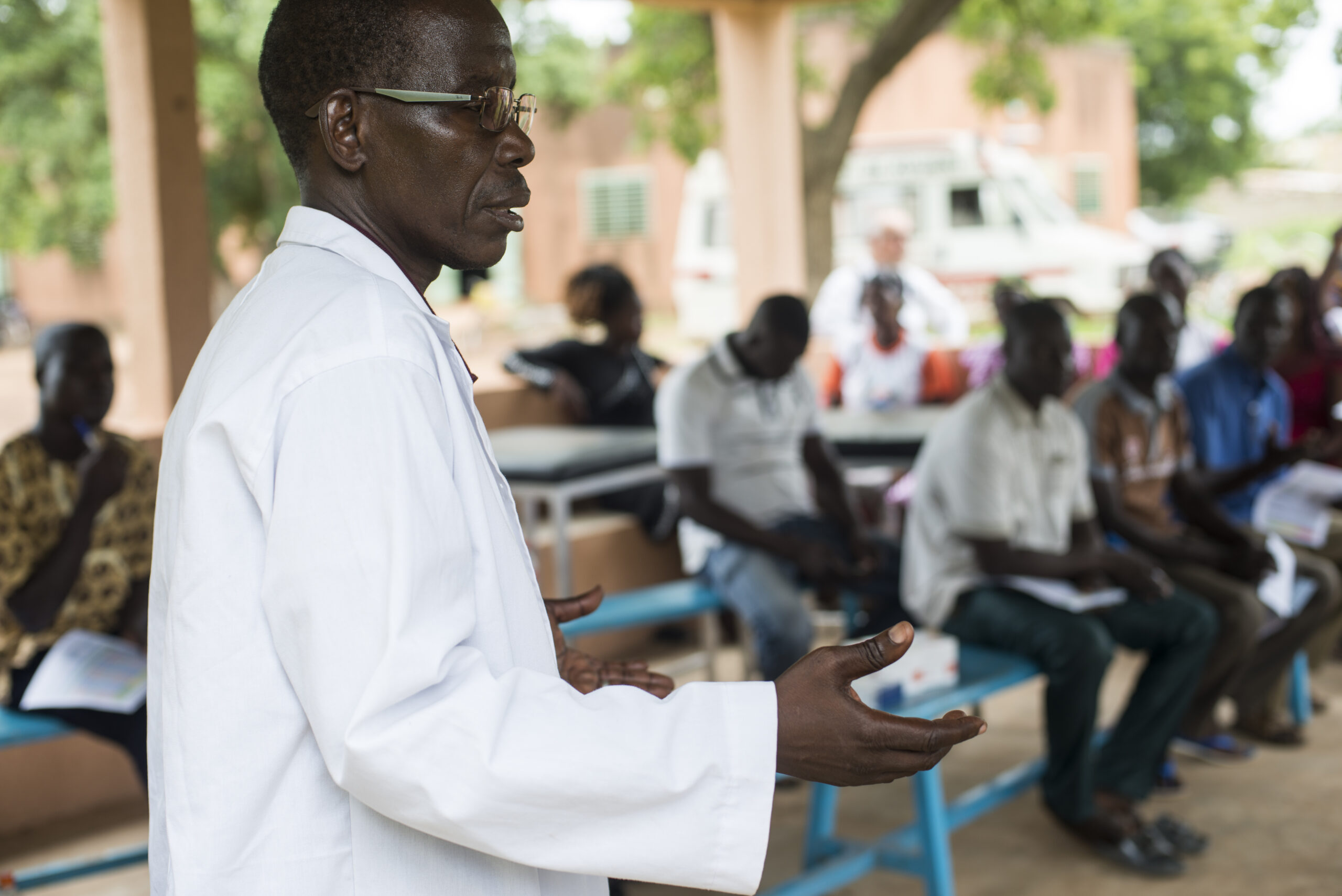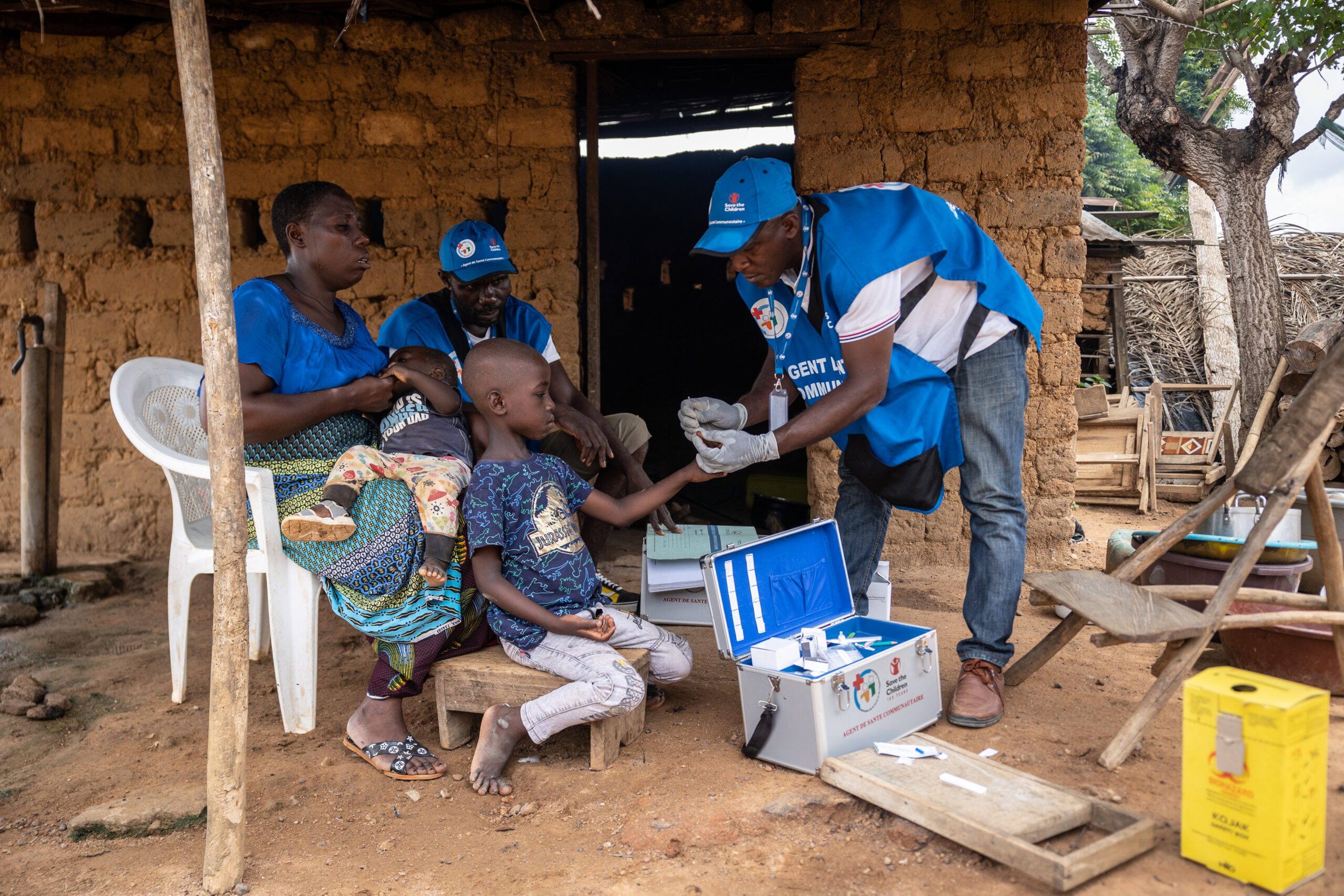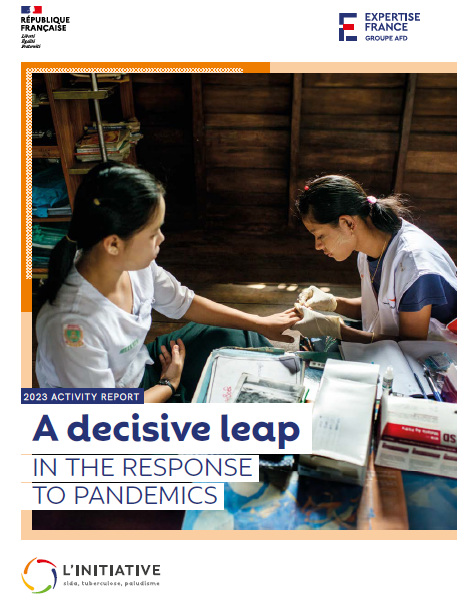Expertise France alignment with government guidelines
In light of the Coronavirus pandemic, Expertise France is adapting the way it operates in line with guidance from the French government. The entire L’Initiative team is mobilized, remotely, to ensure that activities can continue. L’Initiative’s operations have, therefore, been adapted during this period. Since March 17, L’Initiative has suspended all new short-term technical assistance assignments and has terminated short-term assignments underway early. Some assignments, however, are continuing remotely.
L’Initiative adapts its way of working to deal with COVID-19
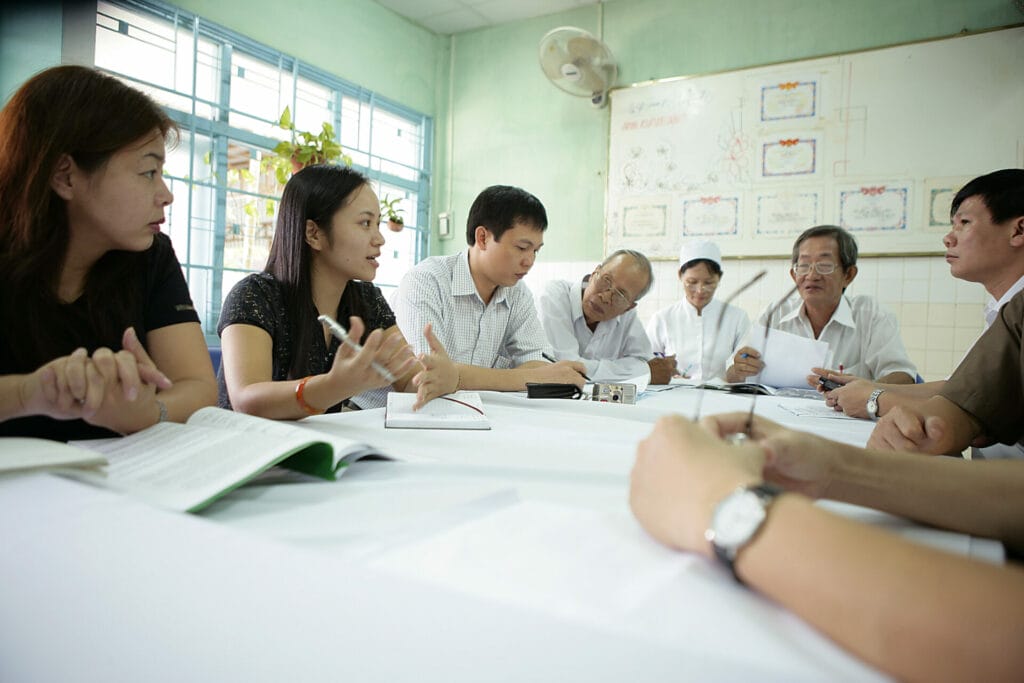
Supporting access to global fund financing
The COVID-19 epidemic has forced L’Initiative to drastically review its Expertise Channel. Priority has been given to continuing, where possible, to support eligible countries that are preparing their new funding requests. Reprogramming support offered by the Global Fund in response to COVID-19 has also been factored in. Other technical assistance assignments had been suspended, but since June 18, 2020, are now available again.
Supporting catalytic activities to develop health environments, policies, and practices
L’Initiative has reviewed its support for project leads (note: contractually linked to Expertise France through L’Initiative).
Each project lead can benefit from the measures put in place in terms of extending and/or suspending agreed activities. In the interest of always being flexible and supportive to project leads, requests can be made directly to L’Initiative project officers.
It is possible to reprogram current projects with a COVID-19 focus: prevention activities, upgrading care provision, ensuring continuity of care and access to treatment, training nursing staff, and procuring necessary equipment (hydroalcoholic gel, gloves, masks, etc.). Reprogramming of up to 10% of the grant can be allocated to COVID-19 activities in connection with activities that are already planned for the project. It was necessary to make amendments to agreements on a case-by-case basis, but reprogrammed activities were able to start with written agreement from L’Initiative before amendments were signed, as an exception.
Finally, for cases where reprogramming was not sufficient, L’Initiative created an opportunity for additional funding to increase resources for stakeholders and partners already receiving support. Through a quick request process (forms provided by project officers), partners can request additional (top-up) funding of up to 15% of the current grant. This additional funding is for activities to respond to COVID-19 only, in connection with activities carried out by the project lead to respond to the three diseases (HIV, TB, and malaria) or to strengthen health systems in L’Initiative-eligible countries. Additional funding requests have been approved quickly and with two submissions per week. All requests were approved by L’Initiative’s steering committee and amendments to agreements have been made.
Supporting research into COVID-19
The French Agency for Research on AIDS and Viral Hepatitis (ANRS) launched on an exceptional circumstances call for projects on April 1, entitled “COVID-19 south,” to urgently support research on COVID-19 in countries with limited resources. The call for projects had a total budget of €6.1 million and comprised funding from ANRS and contributions from its partners: the Ministry of Higher Education, Research and Innovation (MESRI), the French Development Agency, the Ministry of Europe and Foreign Affairs (MEAE), and Expertise France, via L’Initiative. Of the 92 projects submitted, 32 were selected to be funded by the international committee established by ANRS. L’Initiative is funding six projects for a budget of €934,003.
Adapting the call for operational research projects
In light of the exceptional working conditions caused by the COVID-19 epidemic, L’Initiative’s Steering Committee decided to cancel the second call for 2020 operational research projects on the theme of “improving the malaria response in the Greater Sahel and Central Africa regions.”
This second call for proposals was due to be launched on April 1, 2020. The first call, on the same subject, is currently continuing but has been adapted. Project leads, whose letters of intent were selected, had an additional three weeks to submit their full project proposals.
L’Initiative mobilized to inform its partners
L’Initiative is keeping a close watch on how the situation develops and is committed to supporting all eligible countries. Throughout this period, L’Initiative wants to contribute to disseminating evidence-based and accessible information in the form of practical information sheets on COVID-19 and how it links with mechanisms to respond to HIV, tuberculosis, and malaria.
L'Initiative supporting its partners to respond to COVID-19
Given the scale of the COVID-19 health crisis, L’Initiative is adapting its ways of working and providing flexibility to the projects it supports. All project leads therefore have the opportunity to reprogram some of their activities to focus on COVID-19 (procuring prevention equipment, training nursing staff), and where relevant, to request additional funds (up to 15% of the total project) to develop activities to combat COVID-19.
Find out more about L’Initiative support to:
- Assess the impact of COVID-19 on tuberculosis;
- Provide health coverage for migrants in the context of COVID-19;
- Promote access to quality health services for key populations in the context of COVID-19;
- Maintain malaria elimination efforts in Cambodia;
- Build the capacity of community actors in the transport sector in Cameroon;
- Implement an emergency plan for key populations in Mauritania;
- Establish an HIV testing and counseling service in six provinces of Thailand;
- Combat counterfeit drugs in the context of COVID-19 in Côte d’Ivoire;
- Conduct targeted interventions with drug users in Abidjan;
- Develop a monitoring system for people with living disabilities to respond to HIV and AIDS and COVID-19;
- Improve training for health staff in the context of COVID-19;
- Establish a response strategy for community organizations in Cameroon.
Assessing the impact of COVID-19 on tuberculosis
The first project to benefit from this mechanism was the APRECIT project, which is conducting operational research in Madagascar and Cameroon and is led by Fondation Mérieux, in partnership with Institut Pasteur in Madagascar and Cameroon and with the organization Camnafaw.
The main objective of the study is to compare several screening strategies for latent tuberculosis and to select the most relevant for local contexts. Through reprogramming €28,500 and additional funding of €151,076, the Fondation Mérieux team plans to:
- develop a new serological test for Coronavirus on an open platform;
- a combined latent tuberculosis and COVID-19 test with two cohorts of people involved in the study.
Ultimately, this should contribute to analyzing interactions between tuberculosis and COVID-19, and in particular to determine whether COVID-19 influences the transition from latent tuberculosis to active tuberculosis.
>> Find out more about the APRECIT project on the Fondation Merieux website
⬆️Find out more about L’Initiative support in the context of COVID-19
Providing health coverage for migrants in the context of COVID-19
In response to the health crisis brought about by the Coronavirus epidemic, Thailand has imposed lockdown restrictions on its population since March 22, 2020. Borders have been closed, which has particularly affected migrants and beneficiaries of the Dreamlopments solidarity enterprise project. Many migrants have lost their jobs, and some have returned to their country of origin (Myanmar, Cambodia). Illegal immigrants in Thailand do not benefit from the financial support provided by the Thai government to companies and workers. Government information provision and COVID-19 detection activities are also extremely limited among migrant communities.
The M-FUND project, funded by the Global Fund, Expertise France, and UNICEF, implements an innovative non-profit, low-cost health insurance model for Myanmar migrants living in Thailand. Through reprogramming €8,300 and additional funding of €80,654, community workers who work with migrant communities on a daily basis in the context of this project, will be able to:
- Cover the renewal of registrations of current M-FUND members for an additional three months;
- Cover a proportion of the health costs;
- Conduct prevention and awareness activities covered by M-FUND.
This support will enable the M-FUND project to limit the health and economic impact of COVID-19 on this marginalized migrant population living in Thailand.
>> Find out more about the M-FUND project on the Dreamlopments website.
⬆️Find out more about L’Initiative support in the context of COVID-19
Access to quality services for key populations in the context of COVID-19
The project led by Coalition Plus in 10 countries (Cameroon, Madagascar, Mali, Morocco, Mauritius, Mauritania, Niger, Senegal, Togo, and Tunisia) has been contributing to improving provision of HIV services adapted to the needs of key populations since 2017.
As soon as the World Health Organization (WHO) declared that the COVID-19 health crisis was a pandemic, project activities were suspended. As the technical support provided by Coalition Plus platforms involved international travel and meeting in groups, the NGO took the responsibility not to contribute to spreading the epidemic or to exposing community stakeholders to COVID-19, as they play a key role in services to provide comprehensive care to key populations.
Health services targeting key populations have also been impacted, as social distancing measures and total or partial lockdowns have been adopted by the governments. Therefore, activities relating to community testing, psychosocial support, referrals to care, keeping people in care, and sexual health cannot be carried out without community stakeholders having the necessary means and tools to provide at least minimum service delivery while ensuring that COVID-19 is not being spread.
With additional funding of €223,287, Coalition Plus members involved in eight countries are mobilizing themselves to doing everything possible to ensure continuity of access to health services for the most vulnerable key populations in the context of COVID-19. They will be able to:
- Maintain a minimum package of HIV prevention services for key populations by strengthening virtual prevention activities and continuing activities at the organizations’ premises;
- Provide care for people living with HIV through psychosocial support activities by phone to reduce the number of people lost to follow-up;
- Respond to crucial emergencies among people living with HIV by distributing food aid, hygiene kits, emergency financial aid, and transport allowances to enable them to travel for their medical check-ups.
This support will therefore enable Coalition Plus and its partners to maintain a minimum package of services for comprehensive care of HIV in a socioeconomic context that is all the more fragile and where key populations, who are marginalized and surviving from one day to the next through informal economic activities, have seen their living conditions deteriorate through containment and social distancing measures.
>> Find out more on the Coalition Plus website
⬆️Find out more about L’Initiative support in the context of COVID-19
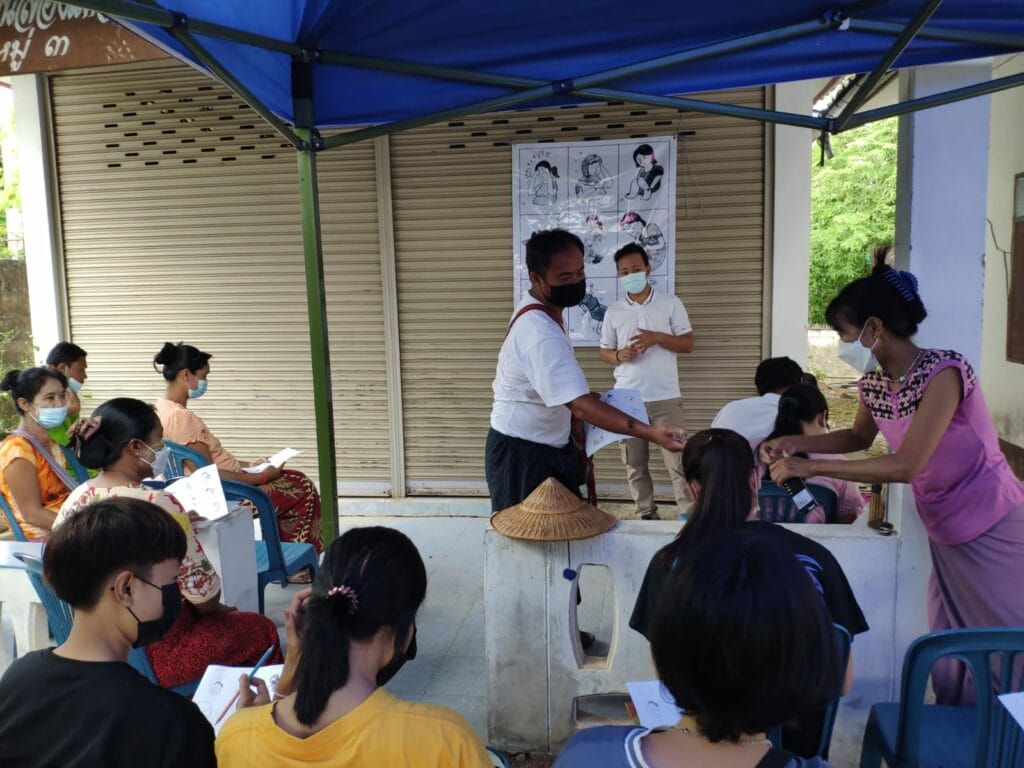
Maintaining efforts to eliminate malaria in Cambodia
Supported by L’Initiative, Institut Pasteur in Cambodia, and its partner, Partners for Development, are implementing a research project on the transmission of malaria in vulnerable forest populations in the district of Koh Nheak, Mondulkiri province, in the north of Cambodia.
This operational research project, implemented from 2018 to 2021, aims to document malaria transmission in forests to improve prevention through a network of workers in forest areas. The first phase of the project aimed to document modes of transmission in forest areas. The intervention phase of the project, which should have begun in June 2020, will build on results of the first phase and will enable 30 workers to be recruited and trained to provide preventative malaria treatment (artesunate-mefloquine (AS-MQ)) to forest rangers. To document the effectiveness of the intervention and assess the prevalence of infected mosquitoes, mosquito collections will be carried out throughout the project.
With an incidence of 0.2 cases per 1,000 people in the first six months of 2019, Cambodia is considered one of the countries most committed to eliminating malaria. Between the end of 2018 and the end of 2019, malaria incidence fell by 45%. One of the key factors for reducing malaria incidence and mortality relates is the very large-scale deployment of village volunteers and specific interventions that make it possible to reach populations living in the most affected areas, such as forest areas. In Cambodia, unlike Africa, the majority of mosquitoes that transmit malaria are found in forest areas. Therefore, this is where people get infected.
In Cambodia, 124 cases of COVID-19 have been reported, and no deaths reported. However, due to surveillance systems in Cambodia not being entirely reliable, assessments of COVID-19 transmission remain limited. In addition, at the point that neighboring countries were imposing lockdowns and closing borders, it is estimated that around 100,000 people returned to Cambodia and that 300,000 people left Phnom Penh for the rural areas. To ensure that implementation of this malaria research project continues as planned, without interruptions due to the challenges posed by COVID-19, L’Initiative has awarded Institut Pasteur in Cambodia additional funding of €14,370. This grant will allow Institut Pasteur to provide essential prevention equipment to all project partners and beneficiaries (gel, masks, prevention materials) and to conduct prevention and awareness-raising activities around COVID-19.
>> Find out more on the Institut Pasteur Cambodia website
⬆️Find out more about L’Initiative support in the context of COVID-19
Mobilizing to build the capacity of community actors in the transport sector in Cameroon
In order to improve prevention among the population and strengthen access to healthcare for vulnerable populations in the transport sector, who are considered a group at higher risk of having HIV, the MOVIHCAM HEALTH ON THE ROAD (MHR) program aims to strengthen the effectiveness of community and health stakeholder prevention activities in high-vulnerability areas of Cameroon.
The project, which follows on from an initial project funded by L’Initiative from 2015 to 2018, is aimed at community-based organizations (CBOs) targeting vulnerable transport populations and their partners. It provides them with targeted, contextualized intervention and awareness-raising training and educational tools. It stands out due to the decentralized community health approach and innovative strategy it uses. The project deploys a mobile health truck to deliver multi-disease prevention and diagnostic activities (tuberculosis, HIV, malaria).
From April 2020 onward, Cameroon has been in a generalized COVID-19 epidemic phase. Nine out of ten regions of the country have been impacted. Activities in the country have slowed down due to the ban on gatherings of more than ten people. Social distancing is strongly recommended but is difficult to maintain in certain public places such as markets, places of worship, and bus stations. Organizational activities are reduced, with staff working remotely, and limitations in the capacity to accommodate and secure access for certain organizations. Consultation meetings involving national stakeholders have either been postponed or are still taking place with physical distancing. Due to the nature of their profession, vulnerable populations in the transport sector are particularly exposed to COVID-19. Difficulties accessing health care and the influence of false beliefs increase their vulnerability to Coronavirus. In addition, community workers working with these populations at the regional level do not have equipment or awareness-raising tools and are also on the front line for the COVID-19 response.
In light of this situation, the NGO, Moto Action, has received support from L’Initiative to reprogram activities to the tune of €10,426 and they have received additional funding of €90,150. This support will allow Moto Action to put in place a specific strategy to respond to the COVID-19 pandemic. This includes:
- Enhance and make safer the working conditions for community stakeholders working with vulnerable populations in the transport sector;
- Build the capacity of community stakeholders on an ongoing basis to implement integrated activities to respond to COVID-19 and to prevent HIV and AIDS;
- Contextualize prevention messages to enhance awareness-raising interventions linked to COVID-19 and HIV prevention in the community and with beneficiaries.
Moto Action‘s strategy, therefore, focuses on project stakeholders and sets out to make community interventions more effective with transport sector populations, who are on the front line in terms of COVID-19, given that they are continuing their professional work, are moving around and are in close contact with the population.
>> Find out more on the Moto Action website.
⬆️Find out more about L’Initiative support in the context of COVID-19.
An emergency plan for key populations in Mauritania
In order to support key populations (KPs) and people living with HIV (PLHIV), the project led by SOS Pairs éducateurs and funded by L’Initiative in 2018, aims to help expand and improve the quality of HIV testing provision in Mauritania. The objective is to build the capacity of ten local civil society organizations (CSOs) in the area around combination HIV prevention testing using in non-clinical community settings approach. Through this project, SOS Pairs éducateurs will replicate and adapt the capacity-building process that the organization itself benefited from over the past three years through support provided by the MENA Platform and Coalition Plus, funded by L’Initiative and Coalition Plus.
Mauritania anticipated the COVID-19 pandemic exceedingly early on by implementing measures such as curfews, closing borders, and closing or reducing non-essential activities in the country. In this context, community-based HIV activities have been reduced, increasing the vulnerability of key populations who are already very vulnerable in normal circumstances. Medical care and monitoring for people living with HIV, men who have sex with men, and sex workers have been affected by the health crisis. As of March 30, 2020, there has been an estimated decrease of approximately 50% in weekly outpatient HIV treatment center consultations in the country.
In the context of COVID-19, SOS Pairs éducateurs, through a response strategy, wants to support key populations and PLHIV, who have been made more vulnerable by the health crisis by contributing to improving care provision and by meeting basic food and hygiene needs. SOS Pairs éducateurs is, therefore, receiving L’Initiative support to reprogram certain project activities related to COVID-19. Reprogrammed activities amount to €34,349and will enable the NGO to distribute food and hygiene kits to more than 200 people in Nouakchott and Nouadhibou. This response strategy will be possible thanks to financial support from L’Initiative. SOS Pairs éducateurs also receives additional support from Coalition Plus, which through additional funding from L’Initiative, contributes to ensuring ongoing care provision in Mauritania.
>> Find out more on the SOS Pairs éducateurs website
⬆️Find out more about L’Initiative support in the context of COVID-19
Establishing an HIV testing and counseling service in six provinces of Thailand
Building on the experience of the Napneung project, funded by L’Initiative between 2015 and 2019, the Chiang Mai University in Thailand began a second project in October 2019 to support an innovative approach to counseling, testing, patient referrals, and PrEP delivery in six sites in the north of the country.
The project aims to improve access to HIV prevention, testing, and referral services for populations most-at-risk in Thailand. This scale-up project will strengthen the skills of medical staff in public facilities, in particular through developing online training to reduce prejudice and discrimination against these population groups. This will help to establish a label of quality for HIV testing services. The strictly anonymous and free service that takes less than an hour has already proven effective in the first phase of the project, during which more than 5,000 people were tested across four sites in the provinces of Chiang Mai and Chiang Rai. It made it possible to reach at-risk population groups that had never been tested before (it was the first test for 65% of those tested) by providing them with a high-quality and easy-to-access service. In addition to the online training program, an innovative element of the project is the potential to make an appointment online or by phone, and there is a new approach being used to remind at-risk individuals of their next appointment to be retested.
The Coronavirus health crisis has had an impact on the Napneung-2 project. As of May 20, 2020, more than 3,000 cases of COVID-19 had been identified in Thailand. In order to tackle the pandemic, a state of emergency was declared and a curfew was put in place in March, which has made it possible to gradually stop the spread of the epidemic, but it has come at a cost, with community activities being majorly disrupted. Travel within and outside the country has also been severely limited. There has also been much less demand for and provision of, HIV testing. Uncertainties around the risk of transmission of SARS-CoV-2 have discouraged people from testing and discouraged the counselors involved in HIV testing themselves. In addition, to cope with the crisis, several medical and laboratory staff have been drafted to undertake urgent activities related to COVID-19, which has had a negative impact on conducting HIV tests within the context of the project.
L’Initiative is currently supporting Chiang Mai University with project reprogramming (for an amount of €14,980) and with additional funding of €131,560 for activities related to the COVID-19 response. The purpose of this support will be to:
- Ensure HIV prevention services can continue by minimizing the risk of SARS-CoV-2 transmission;
- Assess the impact of the COVID-19 pandemic on risky behaviors related to HIV transmission among key populations and on the demand for testing at community level.
These COIVD-19 activities will, as a precaution, be implemented for the entire duration of the project, as Chiang Mai University is working on the assumption that the effects of the pandemic on HIV transmission risks and the need to respond to them will persist, due in particular to measures taken to limit the risk of SARS-CoV-2 transmission.
⬆️Find out more about L’Initiative support in the context of COVID-19
Combating counterfeit drugs in the context of COVID-19 in Côte d’Ivoire
In Côte d’Ivoire, the official toll of the Coronavirus epidemic on April 22, 2020 was 952 cases, including 314 people recovered and 14 deaths. In light of this, the Ivorian government has activated its Public Health Emergency Operations Center (COUSP) to respond to the COVID-19 pandemic. The Côte d’Ivoire public health pharmacy (PSP-CI), funded by L’Initiative, is involved in this response. PSP-CI leads the COUSP logistics task force and the operational coordination unit responsible for procurement in Côte d’Ivoire. In this context, the black market and trafficking of low-quality and counterfeit pharmaceuticals have increased. There have been many WHO international alerts relating to counterfeit chloroquine and counterfeit tests for HIV and AIDS, among others. In addition, counterfeit hydroalcoholic gels and masks of questionable quality are circulating in Côte d’Ivoire. PSP-CI manages the procurement, storage, and distribution of pharmaceutical and laboratory products, so it plays a significant role in the context of the national response plan.
The MEDTIC project, led by PSP-CI, aims to promote digital innovation to improve effective management of essential drugs, such as antimalarials, antiretrovirals, and anti-tuberculosis drugs in Côte d’Ivoire. In the context of COVID-19, L’Initiative has provided an additional €119,282 to enable PSP-CI to contribute to the response to the Coronavirus epidemic by strengthening treatment management for the disease, in particular through validated treatment protocols and access to quality, safe, and effective pharmaceutical products. The project team will be able to:
- Alert the general public to the dangers of the black market and of low-quality and counterfeit pharmaceuticals linked to COVID-19 and to the risks of self-medicating to treat Coronavirus;
- Check the quality of hydroalcoholic gels, masks, and drugs.
The MEDTIC project is committed to combating low-quality and counterfeit pharmaceuticals and therefore contributes to limiting public health risks linked to COVID-19 in Côte d’Ivoire.
>> Find out more on the NPSP website.
⬆️Find out more about L’Initiative support in the context of COVID-19
Targeted interventions with Abidjan drug users
As of May 5, 2020, Côte d’Ivoire had recorded 1,464 cases of COVID-19, including 701 people who had recovered and 18 deaths. In response to this health crisis, the government has taken various steps to limit the spread of the epidemic. Despite efforts undertaken, the risk of spreading the virus remains high, particularly in the Abidjan autonomous district, where most of the positive COVID-19 cases have been recorded. Challenges to comply with protection and physical distancing measures in certain districts of Abidjan, and the lack of information, human resources, and equipment within the national health system are all factors favorable to an epidemic outbreak in the country. Health risks are even greater for population groups that are far from healthcare services, either due to being in precarious situations and/or being marginalized.
People who use drugs who are in precarious situations are particularly vulnerable. They often live in unsanitary areas, without access to water or hygiene, and experience various health issues, such as respiratory problems. For example, tuberculosis, which sometimes has symptoms that are very similar to COVID-19 symptoms. Social insecurity among this population group, who often have no fixed abode or family support, makes it difficult for them to comply with protection measures. Drug inhalation is a mode of transmission for various diseases, including COVID-19. Where the virus is present in places of drug use, this represents a risk for people who use drugs and has a significant impact in terms of public health.
In response to this health context, Doctors of the World is supporting the national response to the COVID-19 pandemic through targeted interventions with drug users in Abidjan. As part of the project entitled “consolidating adapted, integrated and accessible healthcare provision for drugs users, who are vulnerable and in precarious situations, to respond to the three pandemics together,” which has been implemented in Abidjan since 2015 with funding from L’Initiative, the following will be undertaken:
- Limit the spread of the virus within project intervention areas using a community approach. Provide prevention methods (install pedal hand-washing devices near smoking rooms (drug consumption areas), distribute masks, and hygiene and maintenance kits, etc.), and conduct awareness-raising sessions tailored to the context of the target population;
- Ensure the safety of project teams (around 150 people) and manage COVID-19 cases effectively. Provide these individuals with personal protective equipment adapted to the type of health intervention. The four health centers, which are implementing partners of the project, will receive regular disinfection sessions and the technical and health platform of eight centers will be strengthened;
- Prevent the development of other health issues by supporting the management of mental health issues and urgent health needs of highly vulnerable drugs users and food support for people using smoking rooms.
L’Initiative is supporting Doctors of the World in Abidjan by providing additional funding of €289,426. This support will enable the NGO to ensure that all prevention and routine activities can be carried out by its teams and that they are adapted to the COVID-19 context to avoid increased mortality due to other illnesses.
>> Find out more on the Doctors of the World website
⬆️Find out more about L’Initiative support in the context of COVID-19
A monitoring system for people with disabilities in the fight against HIV/AIDS and COVID-19
In Mali, HIV prevalence among the general population is 1.1%. A bio-behavioral survey, supported by L’Initiative and conducted in 2019 by Humanity & Inclusion and the Malian Federation of Organizations of Persons with Disabilities (FEMAPH), revealed that prevalence is 2.3% among people living with disabilities. In addition, the inclusion of this population group in national strategies has been increasingly affected by the crisis that the country has faced since 2012.
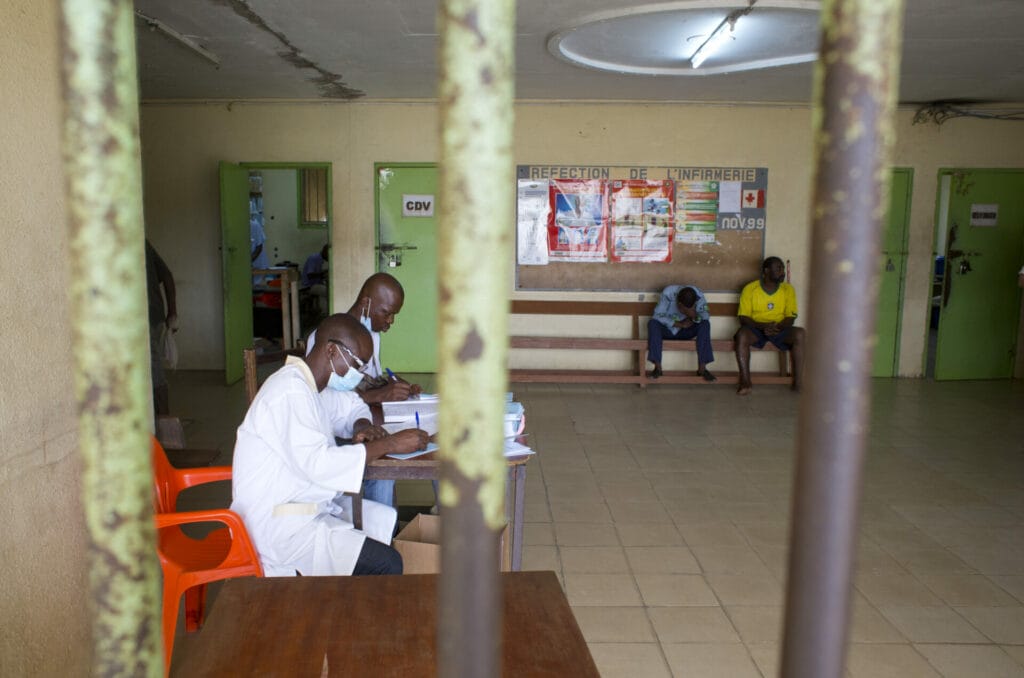
To respond to the issue of ensuring people living with disabilities have access to HIV and AIDS services, L’Initiative has supported the project entitled “Improved access through the inclusion of all in the HIV and AIDS response” since 2018 in Mali ”(AAml-Tous), led by FEMAPH in Mali. The project objective is to contribute to achieving the UNAIDS 90-90-90 targets by improving the inclusion of people living with disabilities in the country.
FEMAPH has reprogrammed some of its activities for an amount of €43,888 to respond to the threat of the COVID-19 pandemic on effective implementation of project activities. Reprogramming will enable the project lead to temporarily suspend activities linked to COVID-19 transmission risk. The aim is to suspend mobile testing with organizations of people living with disabilities in communities and schools and training for psychosocial counselors. These activities will resume as soon as the COVID-19 health context allows.
To respond to the COVID-19 pandemic, FEMAPH will develop, in partnership with Humanité & Inclusion and the Malian network of PLHIV organization (RMAP +), new activities to:
- Design COVID-19 prevention messages and provide guidance to people living with HIV around access to ARV care and treatment during this health crisis;
- Produce and distribute COVID-19/HIV awareness materials for the 16 partner civil society organizations and RMAP +;
- Provide network organizations with hygiene products and protective equipment to comply with protection measures.
Reprogramming to respond to the COVID-19 context will allow FEMAPH and its partners to set up a monitoring system for people living with disabilities. The objective is to improve their access to prevention, treatment, and social support services by the end of 2021.
⬆️Find out more about L’Initiative support in the context of COVID-19
Improving training for health staff in the context of COVID-19
The 2013 crisis had a negative impact on the health context in the Central African Republic by increasing the country’s deficit in human resources for health. Low wages (around 122 Euros per month for a nurse) pushed qualified staff to join other organizations and the deficit in healthcare providers increased, particularly outside Bangui. Providers trained by humanitarian organizations sometimes find it difficult to (re)integrate into the health pyramid.
Providing paramedic training adapted to health needs is essential to improve the quality of health services. The French Red Cross has previously been involved in establishing the University Paramedic Training Institute in Bangui (IUFP), managed by the Central African Red Cross. Since 2017, L’Initiative has been supporting the project to regenerate paramedic training provision and support ongoing education for paramedic staff, which was implemented by the French Red Cross in the Central African Republic. This project strengthens the establishment’s operations and optimizes provision.
As of March 2020, significant measures have been put in place by the government to reduce Coronavirus transmission risks. All borders, schools, and universities have been closed and suspected cases of COVID-19 have been systematically quarantined. Despite these measures, there are still many gaps: oxygen systems and respiratory support equipment, qualified staff and protective equipment are not all available.
The French Red Cross is adapting its activities to meet these challenges. As part of a contingency plan, the project now aims to improve the internship conditions for students at the IUFP in Bangui. Students and their supervisors will be provided with personal protective equipment (gowns, masks, gloves, hair covering, and hydro-alcoholic gels). 22 people from the IUFP will be trained and made aware of COVID-19 treatment—19,578 leaflets will be produced and distributed to students to make them aware of personal protective measures and the use of personal protective equipment. Compulsory hand-washing points will be set up at the Institute. In the Berberati health district, 14 healthcare facilities will be strengthened. Hygiene kits, as well as patient protection and triage materials, will complement training on prevention, infection control, and community mobilization around COVID-19.
L’Initiative is supporting the French Red Cross by reprogramming activities for an agreed amount of €24,350 and is providing additional funding of €153,571 Euros. This support will improve the quality of paramedic training in the Central African Republic in the context of COVID-19.
>> Find out more on the French Red Cross website.
⬆️Find out more about L’Initiative support in the context of COVID-19
A response strategy for community organizations in Cameroon
In Cameroon, HIV prevalence is very different between the general population and key populations. The burden of the HIV epidemic is disproportionately high among key populations in Cameroon. An epidemiological study (CAMPHIA) carried out in 2018 estimates the HIV prevalence to be 3.4% among the general population. For men who have sex with men (MSM), prevalence was estimated in 2016 by an IBBS study at 45% in Yaoundé and 25.7% in Douala. Taboos, prejudices, and violence relating to transgender people, sex workers, and men who have sex with men are all forms of discrimination that hinder access to health services among these vulnerable groups. This hostile context makes the work of community-based organizations (CBOs) difficult. However, they are the best placed to provide adapted services to key populations.
The “Proximity” project, led by Alternatives-Cameroon and funded by L’Initiative since 2018, aims to make twelve community-based organizations referral structures to provide services related to HIV and sexually transmitted infections, adapted to MSM and transgender people. It will, therefore, be a question of training health assistants on PrEP and testing in non-clinical setting, and doctors in screening and managing proctological problems. During the first semester of the project, 150 health assistants were trained, and more than 1,000 tests were carried out. Ultimately, the project tends to give greater visibility to the concepts of testing in non-clinical settings, PrEP, gender identity, treatment as prevention and proctology. Communications and advocacy materials will be designed to spread information about these concepts.
In order to address obstacles caused by the COVID-19 pandemic in Cameroon, Alternatives-Cameroon is deploying a response strategy using a community outreach approach to deliver quality information and prevention measures to provide care to patients. Training and awareness sessions on COVID-19 will be organized for staff from the 12 organizations. To reduce the risk of Coronavirus transmission, precautions and protective measures will be used systematically during project activities. The project partner organizations will, therefore, be provided with hydroalcoholic gel, masks, disinfectant solutions, and digital thermometers. Finally, to reduce discrimination experienced by MSM and transgender people, Alternatives-Cameroon will establish a support system for people affected by COVID-19, victims of violence and people in vulnerable situations. Support packages (food, medicine, hygiene kits) will be distributed to the most vulnerable people.
L’Initiative is supporting Alternatives-Cameroon’s response strategy through additional funding of €90,000. This support will enable Alternatives-Cameroon to carry out its activities and reduce the social impact of the COVID-19 pandemic on transgender people and men who have sex with men.
>> Find out more about Alternatives Cameroun
⬆️Find out more about L’Initiative support in the context of COVID-19
